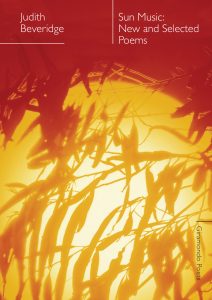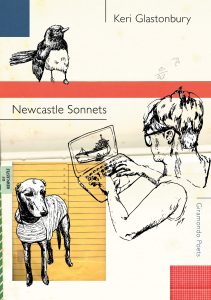Judith Beveridge, Keri Glastonbury and Suneeta Peres da Costa have been shortlisted for the Prime Minister’s Literary Awards
We are thrilled to announce that three Giramondo titles have been shortlisted in the 2019 Prime Minister’s Literary Awards. They are Saudade by Suneeta Peres da Costa for the Fiction Prize, and Sun Music: New and Selected Poems by Judith Beveridge and Newcastle Sonnets by Keri Glastonbury for the Poetry Prize.
Please see below for the judges’ comments.
Suneeta Peres Da Costa’s – Saudade – is a beautifully conceived story told from the perspective of a young Goan migrant who lives with her family in Angola during the last years of Portuguese occupation. The author’s eye for vivid and telling details evokes the African setting in all its colour and richness. A sensitive portrayal of the narrator’s developing consciousness and her sense of uncertainty about her place in the world, the narrative explores the themes of displacement and belonging on an intimate level, through her relationships with her mother, the more distant figure of her father, and the family’s servant, Caetano. Beyond these personal relationships, it develops a nuanced understanding of the workings of race and class within a complex colonial society. Saudadeis notable for the gorgeous fluency of its prose style. Its moving story is told with an elegance and concision that exemplify the virtues of the novella form.
With joyous fluency and formal mastery, Beveridge’s Sun Music: New and Selected Poems draws the reader into an electrifying encounter with language, guiding us through its flexure and torsion, its exacting grace. The selection of new poems in Sun Music linger on both the human and animal worlds, from the delicate texture of Banaras silk sari to cane toads to the act of juicing sugar cane, and are marked by their clarity of perception and attentiveness to textural and sonic detail. The titular elegy, ‘Sun Music’, is one of several where the poet turns to more personal territory, mourning the loss of a father who found redemption from drinking through bird-watching, finding himself ‘intoxicated / by the sea, the sky, the spindrift a new / spell he could steer his life by’. Beveridge takes a similarly ecstatic pleasure in the elements in many of these new poems, which balance the clamouring external landscape with a meditative, introspective interior world that increasingly seeks a language for loss and grief.
Keri Glastonbury’s Newcastle Sonnets is a post-industrial love song to the city of Newcastle: once working-class heartland, now a world-topping hipster cities. To Glastonbury’s eye the city is a ‘chiaroscuro of coal dust and sand’ – ‘plum blossoms line Pinnaroo Drive’ while ‘a shopping trolley rusts at the rocks’. Glastonbury’s sonnets, far from stultifying, are energetic and playful as they enact the associative freedoms of everyday speech. Her tone – wry, not sappy, politically savvy, not didactic – acts as a stabilising force beneath the nervous surfaces of the poems, allowing her to say whatever pops into her head without appearing random. Variously the poems address lovers and friends and frequently incorporate comical cameos from the political class – Tony Abbott, Bob Carr, Penny Wong’s speechwriter, and many more – but at least one politically apathetic Novocastrian remains: having none of it, she folds her ‘voting slip into an origami crane’.



